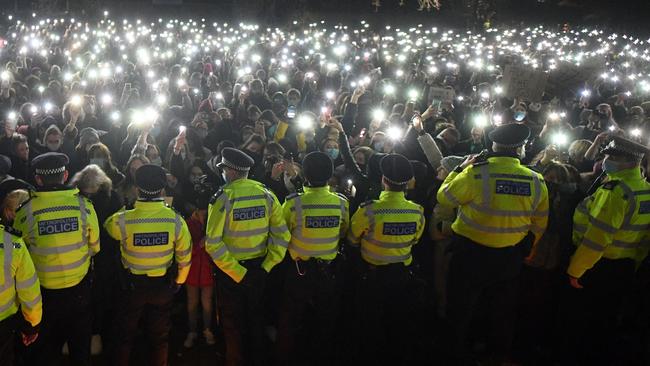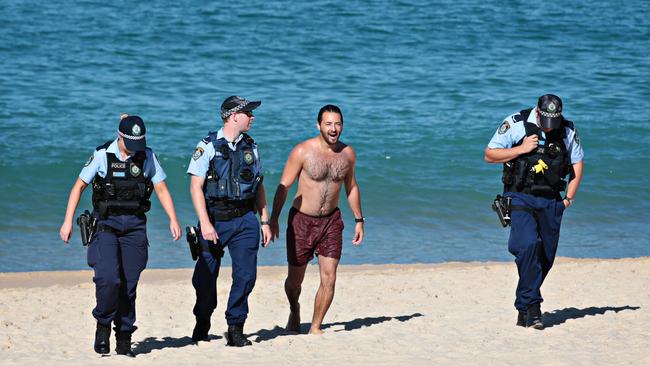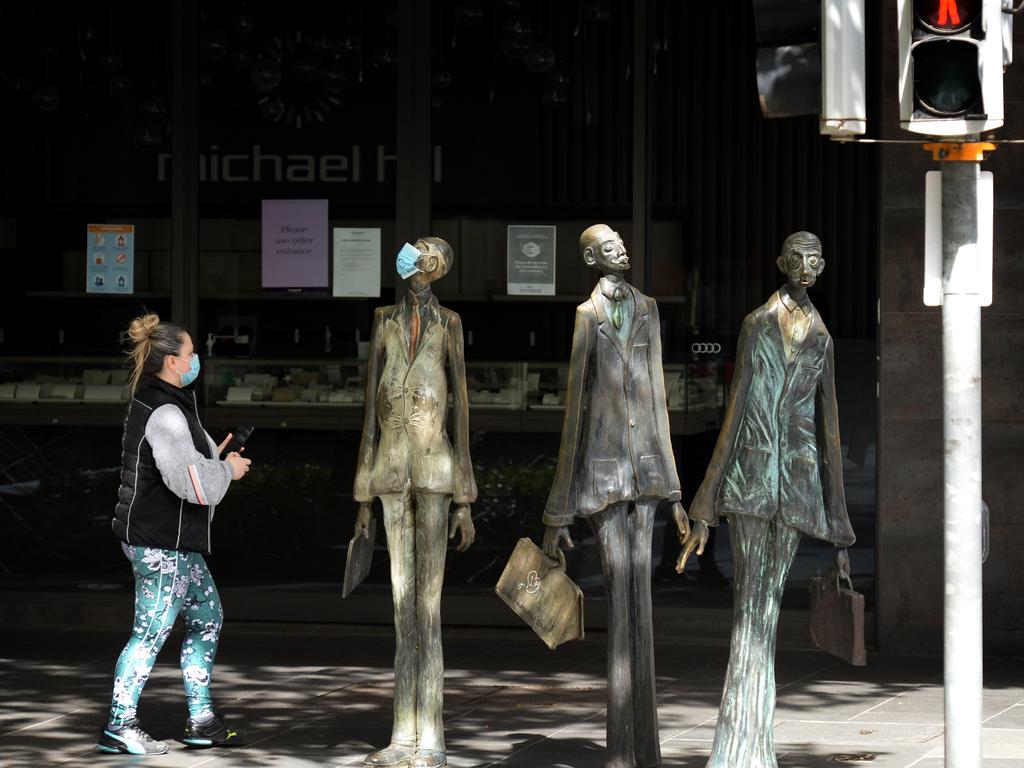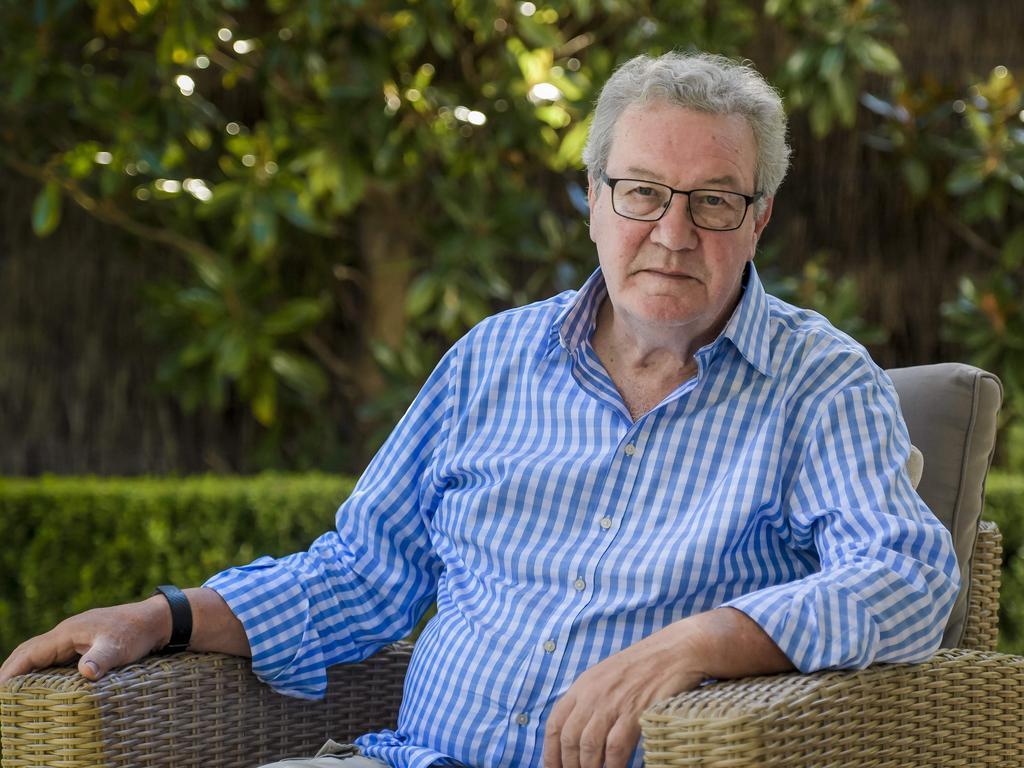No, we won’t cop this Covid jackboot abuse of power
Just as women deserve to reclaim the streets, we must all reclaim our rights and freedoms.

A quiet and sombre Duchess of Cambridge was there, no media fuss, to pay her respects. Just another woman leaving flowers at the bandstand that Everard would have passed by on the night she was taken.
Young women masked-up in a time of COVID still deserve to be heard. One woman held a sign saying: “She was just walking home.” Another held this sign: “If we can’t trust police, who can we trust?”
That is a pertinent question. And not just because a policeman is alleged to have kidnapped and murdered 33-year-old Everard.
The question of trust should be centre stage for another reason: the case for gung-ho policing is being made with chilling frequency. The issue was captured that day in a single photo taken seconds after Stevenson was pushed forcefully to the ground by policemen. She is lying prostrate on the ground, two officers holding her down, her hands held behind her back. The 28-year-old university student is wearing a mask, her long red hair tousled around her face, her eyes looking up, filled with bewilderment.
— Nigella Lawson (@Nigella_Lawson) March 13, 2021
This is not Myanmar during a military coup. This is south London during COVID-19.
Police bosses assured Britons that they acted with force against women to keep people safe.
One of the very worst symptoms of COVID-19 is the lust for power among political leaders, bureaucrats and institutional bosses who claim they need more power to keep us “safe”.
The word is a double-edged sword. Everyone wants to be safe. The No 1 job of government is to keep its citizens safe.
But keeping us “safe” is also meant to keep us quiet. Safety has become a political strategy throughout COVID, a linguistic cloak that politicians wrap around disproportionate powers.
“COVID-safe” has become the kicker to make policing easier beyond the pandemic. This ought to send shivers up our collective spine. Instead, we appear to be in a dangerous state of slumber over what leaders are doing to shore up their powers, while simultaneously taking ours away.
The image of British cops roughing up women at a vigil because they were breaching public health rules coincided this week with a UK policing bill that aims to permanently extend police powers to clamp down on protests.
The Johnson government’s Police, Crime, Sentencing and Courts Bill — introduced to parliament on March 9 — will give police permanent powers to stop protests that would cause “serious disruption to the life of the community”. The Home Secretary will have the power to create secondary laws, without parliament, to define “serious disruption”.
You don’t have to be an anarchist to support protests that are, by their nature, disruptive. They can be a pain in the backside to the community. But we will suffer a much more serious disruption to our democracy if citizens can no longer legally engage in noisy, disruptive protests.
And if protests are getting louder, maybe it’s because people are increasingly forgotten by formal political processes.
You might disagree with the Extinction Rebellion nutters who glue their hands to a highway — but it’s better they be heard than slink underground to the dark and sinister recesses of mocked-up martyrdom.
Lasting social change delivered by democracies is messy, noisy, brilliant, frustrating and awesome as it yanks the stragglers forward. Think of the British suffragettes arrested and imprisoned at the turn of the 20th century. Women didn’t get the vote by chitchatting over cups of tea and cucumber sandwiches. People of colour didn’t cement their civil rights by holding hands and praying.
How easy we forget the legacies handed down to us, and our responsibility to hand them on to the next generation in excellent working condition. In response to the March4Justice protests outside parliament and around the country this week, Scott Morrison said we should be grateful that we live in a democracy where protests are allowed. “Not far from here,” he said, “such marches, even now, are being met with bullets, but not here in this country.”
He ducked the issue at hand. And bullets aside, there are different sorts of dangerous sorties on our freedoms by politicians and police who cannot wean themselves off pandemic powers.
A year ago, the first burst of Public Health Orders led to police trawling our streets in SWAT cars on the lookout for offenders. Police told a pregnant woman to move on from a park bench not far from where I live. Other police officers instructed an old man catching his breath that he was forbidden from resting.

I saw two police officers shout at a few young swimmers to get out of the sea. I asked the police what powers they had to prohibit swimmers from diving in the water off the rocks. I knew they had none. The police backed off. Tame stuff, in retrospect.
But that is how it starts. Power in the wrong hands is like a drug, delivering a dopamine hit to the person who has it. Soon enough they want more; the earlier dose doesn’t suffice anymore. Given that we cannot know upfront who will handle power well, we should always grant all of them the smallest amounts.
The British Prime Minister is meant to be a liberal, after all. But Boris Johnson is not the only liberal gone awry from the heady power kicks delivered by COVID. In South Australia, Premier Steven Marshall has something special in store for voters in a post-COVID world.
As The Australian reported a few weeks, ago, Marshall is proposing a bill — not yet released to the public — that would make many COVID policing powers permanent. Police could issue directions about social and family gatherings, crowd numbers and how businesses operate.
The Marshall government describes the changes as “innocuous” because the state parliament would have to declare a state of emergency before police can use the permanent powers. Attorney-General Vicky Chapman says it’s needed to “modernise some practices in SA”, and additional powers introduced during COVID won’t have to be debated on the floor of parliament in the future.
Beware of “modernisers” who want COVID powers made permanent and shy away from debating them the next time a crisis arises. Grant powers to a power junkie to deal with a once-in-a-century crisis, and they will want them forever.
Marshall has been joined at the hip with his Chief Public Health Officer Nicola Spurrier who recently suggested that QR code monitoring should extend beyond COVID. Why? So that bureaucrats and government can more frequently trace where citizens go?
On paper at least, Marshall is a Liberal. But his heavy-handed and skittish approach to the coronavirus pandemic has been in stark contrast to NSW Liberal Premier Gladys Berejiklian. Her starting position throughout the pandemic is that all restrictions must be sensible and proportionate, and none will stay in place a minute longer than necessary.
Not so Marshall. While some of his Liberal colleagues have been known to call him “Marshmallow” in private, the truth is worse. A Liberal leader who uses a pandemic to amass more power permanently is no friend of our liberal legacy.
Earlier this month, West Australian Premier Mark McGowan would not rule out extending the state’s controlled border entry beyond the pandemic, suggesting it had kept out both COVID-19 — and illicit drugs. Only when news of this hit the media — and with a little over a week until the state election was due to be held — did McGowan backtrack on his plan. But it was an insight into McGowan’s attachment to power.
Ditto Victoria, a state that has become alarmingly conditioned to a rolling state of emergency, with political biases built in to boot. The women’s march went ahead on Monday despite public health restrictions, but will the Anzac Day march receive the same latitude?
The frequent push by political leaders to make policing easier comes at a very high cost. Those with powers ought to work harder to find criminals among us rather than demanding COVID-style permanent powers that undermine our freedoms.
Think about what we are giving up, inch by inch, and day by day. While women are trying to reclaim the streets to be safe when they walk home, we should also be reclaiming our rights to be safe from overzealous politicians, health bureaucrats and police.







Patsy Stevenson went to Clapham Common in London on Monday to join a vigil. The young red-haired woman joined thousands of others throughout the day paying their respects to Sarah Everard, a young woman who was allegedly kidnapped and murdered by a police officer while walking home around 9pm 10 days earlier.